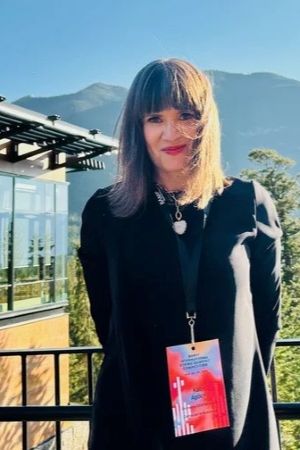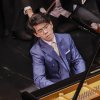Any musician who makes it to the Banff International String Quartet Competition (BISQC) has accomplished something incredible. For the winning ensemble, life begins to resemble a fantasy. BISQC values its prize package, a combination of cash and opportunities, at $500,000 CAD; when the Isidore Quartet took the gold in 2022, the last iteration of this triennial competition, their season skyrocketed that year from a handful of performances to upwards of 80 concerts.
This time, the Cincinnati-based Poiesis Quartet won the competition (which is open to ensembles whose members are under the age of 35). The young quartet will play at Noe Music in San Francisco on Nov. 9.
Hundreds of chamber music aficionados flocked to the Canadian Rockies resort town at the end of August — many for the fourth or fifth time — to see these emerging stars of chamber music before they got famous. But it wasn't just for new talent that so many attendees returned. They came for the music — in this competition, an unusually high concentration of new music.
Over five competition rounds, more than half of the 27 composers featured were born after 1900. A dozen are still living. Several audience members said they’d listened to all the contemporary works in the weeks before the competition so as to be better prepared to receive them live. In the lobby, miniature scores of the new Kati Agócs piece (BISQC commissions a different Canadian composer each competition) were flying off the shelf.
Judging from the whoops and cheers in the audience, these new works were the most exciting. To the jury, though, the classical and romantic works counted for more. This rubric proved unlucky for some groups, like Bremen's Nerida Quartet, whose perfectly dovetailing, hugely resonant performance of Caroline Shaw's Entr'acte, alas, wasn't enough to advance them to the final round.
Two groups, the Viatores Quartet and the Arete Quartet, gave electric performances of Jörg Widmann's 2003 Hunt Quartet, a high-spirited scherzo that takes a sinister turn.
Widmann's writing here is frenzied and, in cartoonish glissandi, funny. But the audience's laughter turns strained as the three upper voices direct their blows — whipping strokes, snap pizzicati — increasingly at the cellist. His bow, under too much pressure, groans on the string. Then the cellist lets out a real groan, one terribly prolonged. At the end of this hunt the audience can't quite decide whether to smile or be solemn. At Banff, they certainly clapped with enthusiasm.
Another fan favorite was the 2014 work Many Many Cadences by American composer Sky Macklay, here in a charismatic and note-perfect performance by the Poiesis Quartet.
From the top of the fingerboard, Macklay's tiny chords cascade like dominos. Gradually the rallies break, the harmonies elaborated in melty chorales. The reprise, distorted through glissandi, is at once zany and high-concept.
More abstract works, too, came off well. The audience warmly received Quartet KAIRI's assured performance of Floral Fairy (2003), for example, a hauntingly gorgeous movement by the avant-garde composer Toshio Hosokawa.
Wrap the rigor of Iannis Xenakis and the timbres of Edgar Varèse in an embrace and you have Pascal Dusapin's Quartet No. 5. The pizzicati are rhapsodic, the chords silty and metallic-tasting; the first violin's high song reaches for harmonics that barely work. Each measure is meticulously structured and yet the music sprawls.
Dusapin's sonorities are undeniably stunning, but it was particularly easy to appreciate them in the performance by Quartett HANA. This Munich-based group played with a sense of yearning. Each gesture was self-contained but maximally expressive.

These impulses turned temperate in the performance by Quatuor Elmire, a Parisian ensemble, whose sound gathered in soft-padded pizzicati and sweet washes of chords. Quatuor Magenta, another Parisian group, also performed Dusapin’s Quartet No. 5, and it was their finest performance of the competition. First violinist Ida Derbesse's tone was rich and enticing, the phrases had longer arcs, and everything flowed.
All nine groups played Rapprochement, a lyrical and multihued movement by Canadian composer Kati Agócs, in the compulsory commission round.
"I liked the word rapprochement [from the French "to approach"] because it's an international word," Agócs explained from the stage. “It starts harmonized in tenths and ends in thirds, it's coming together after a distance, and that’s what the piece is about."
An improvisatory tune weaves through the parts before breaking off in surprising directions. When you least expect it the lines band together in sonorous chants, jaunty rhythmic exchanges, and glassy chords.
The most delicate interpreters of Agócs’s work were the players of the Seoul-based Arete Quartet. Quatuor Magenta made the piece move; everything was airy and easy. The Viatores players assiduously honored Agócs's legato indications; their detaché was thick like brownie batter. This round’s prize for best performance went to the Poiesis Quartet, and they played vibrantly, but every group brought something of interest.
In the Haydn round, the Viatores Quartet stood out with a razor-sharp performance of Quartet Op. 33 No. 1 in B Minor. Their precise articulations underlined the tautness of the first movement, an uneasy truce between minor and major. The genteel Andante was dynamic and utterly refined. Always, the sound was pristine (as it was in their rigorous yet personable performance of Hindemith's Fifth Quartet later in the week). More than any other group, they sounded like one instrument.
Haydn's bold Quartet Op. 54 No. 2 in C Major perfectly suited the Nerida Quartet, especially the slow movement's moody chorale, whose wild, pseudo-Hungarian riffs violinist Jeffrey Armstrong played with abandon. His gestures were theatrical, his phrasing sometimes rough-edged, even brash — the risk paid off.
Intricate shadings by the Arete Quartet imbued the slighter Quartet Op. 20 No. 2 in C Major with a new depth. They didn't only play softly — their rapport had an intimacy and naturalness rare to hear on the competition stage. It was as if the audience was peeping through the living room window at a group of friends having a reading party, one of those magical nights where everything goes right.
Ultimately, three ensembles — Arete, KAIRI, and Poiesis — made the finals, earning a 45-minute recital that, in a competition first, was self-curated.
Poiesis, the competition’s eventual winner, performed four 21st-century works by composers of color — ones that shared a sonic sensibility. Compositionally, the most coherent were Jerod Impichchaachaaha’ Tate's Pisachi (Reveal), a zingy suite inspired by the Native American southwest, and, from Joe Hisaishi's String Quartet No. 1, "Phosphorescent Sea," a cloudy soundscape that glints with resonances. The other pieces had their moments. Violinist Max Ball deftly played the curlicue cadenzas in Kevin Lau's String Quartet No. 7, Surfacing (a Poiesis commission), and in Brian Raphael Nabors’s String Quartet, which depicts a chaotic universe, the brittle opening tarantella crackled with potential.
The Poiesis players’ final performance, at any rate, was magnetic. These musicians have palpable chemistry and a remarkable warmth; you root for them even when another quartet plays a Haydn with cleaner edges or more faultless intonation. These traits are part of the reason — along with some good old-fashioned hard work — that they won the grand prize at the Fischoff Chamber Music Competition in 2023, just over a year after they formed.
Since then, time and resources (including a residency at the Cincinnati College-Conservatory of Music) have afforded the group, which collectively identifies as queer, the opportunity to promote the works of composers from historically marginalized groups. This spring, they'll premiere five commissions by queer and trans composers of color.
Now liberated from the competition circuit and equipped with the BISQC prize package, the group also plans to part ways with the classical canon. Once they've fulfilled their existing commitments, Poiesis will devote their time to music from the 20th century and beyond.
"We love everything quirky and everything cool," said violinist Sarah Ying Ma – projects like their four-violin rendition of the African-American spiritual "Calvary," which Ball arranged to morph into music by the 20th-century Black American composer Coleridge-Taylor Perkinson.
Fitting, then, that Poiesis took their name from ποιεῖν, the ancient Greek form of the verb “to make.”
"Now that we have this off our plate, we have time to be really creative," Ball said. "We're looking forward to getting crazy, seeing what happens."




